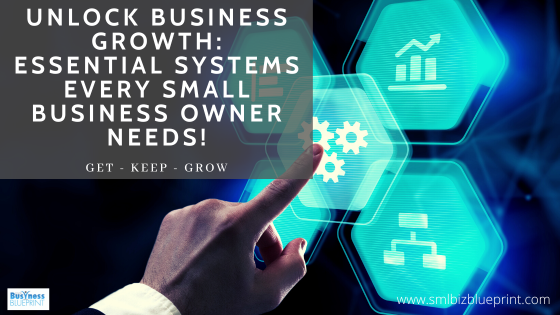Today, small business owners constantly seek ways to streamline operations, reduce overheads, and enhance productivity.
The key to achieving these goals lies in effective systemisation.
This guide delves into the transformative power of integrating structured systems into various facets of your business, from financial management to customer support, and even harnessing the potential of Artificial Intelligence (AI) to automate and optimise your operations.
This overview reveals how systemisation can save time and create a solid foundation for sustainable growth and scalability.
Whether you’re looking to refine your financial tracking, manage inventory more efficiently, improve customer relationships, or automate routine tasks, this guide provides actionable insights and practical tools to help you transform your small business into a well-oiled machine.

#1 Financial Management Systems: The Backbone of Small Business Efficiency
In small business, effective financial management isn’t just a practice—it’s the lifeline that sustains and propels growth. Embracing financial management systems is not merely about keeping your books in order; it’s about unlocking a level of efficiency that can transform your business operations.
By automating critical financial tasks such as invoicing, billing, payroll, and budgeting, you minimise the risk of human error and ensure smoother, more reliable cash flow management.
Automating Your Financial Operations
The cornerstone of systemising your financial processes lies in automation. Implementing tools that automate invoicing and billing can dramatically reduce the time spent on these repetitive tasks, allowing you to redirect your focus towards strategic planning and growth.
Similarly, an automated payroll system ensures that your team is compensated accurately and on time, fostering a positive work environment and maintaining morale.
Navigating Financial Tracking and Forecasting
Beyond the day-to-day operations, financial management systems offer a profound advantage in tracking and forecasting. With the right tools, small businesses can gain real-time insights into their financial health, enabling informed decision-making.
This visibility is crucial for identifying trends, anticipating challenges, and seizing opportunities. Forecasting tools, in particular, can be invaluable for planning future investments, managing inventory, and setting realistic growth targets.
By incorporating financial management systems, small businesses can achieve greater precision, efficiency, and foresight in their operations. The benefits extend beyond mere time savings; they encompass better financial control, enhanced strategic planning, and a stronger foundation for growth.
#2 Inventory Management Systems: Streamlining Operations for Growth
Efficient inventory management is a pivotal aspect of running a successful small business. It’s not just about knowing what’s in stock; it’s about optimising your entire order fulfilment process to meet customer demands swiftly and effectively.
By integrating robust inventory management systems, small businesses can significantly reduce overheads, avoid stockouts or overstock situations, and ultimately enhance customer satisfaction.
The Importance of Efficient Inventory Tracking
Effective inventory tracking goes beyond mere counting. It’s about having real-time visibility into your stock levels, understanding your product turnover rates, and predicting demand more accurately.
This level of insight is invaluable for making informed purchasing decisions, reducing holding costs, and ensuring that you’re always ready to meet your customers’ needs without tying up too much capital in unsold stock.
Automating Inventory for Maximum Efficiency
One of the key benefits of modern inventory management systems is their ability to automate many of the time-consuming tasks associated with inventory control. From automatically updating stock levels when sales are made to sending alerts when inventory is low, these systems can significantly reduce the manual effort required to manage inventory.
Moreover, by integrating with your sales channels, whether online or in-store, you ensure consistent inventory data across all platforms, reducing the risk of overselling and enhancing the overall customer experience.
Tools and Methods to Elevate Your Inventory Management
The market offers many tools designed to streamline inventory management for small businesses. From cloud-based solutions that provide access to your inventory data from anywhere to sophisticated systems that offer predictive analytics for demand forecasting, the right tools can make a substantial difference in how efficiently your business operates.
Furthermore, many of these systems can be seamlessly integrated with other business systems, such as your financial management and CRM platforms, creating a cohesive ecosystem that drives efficiency across all operations.
By prioritising inventory management and leveraging suitable systems, small businesses can achieve a new level of operational efficiency. This leads to cost savings and improved profitability and positions your business for scalable growth.
#3 Customer Relationship Management (CRM) Systems: Enhancing Engagement and Sales
Fostering strong customer relationships is paramount in the competitive landscape of small businesses. Customer Relationship Management (CRM) systems are not just tools for managing contacts; they are powerful platforms that enable a deeper understanding of customers’ needs, preferences, and behaviours.
By implementing a robust CRM system, small businesses can streamline customer interactions, enhance sales processes, and ultimately drive higher customer satisfaction and loyalty.
Centralising Customer Interactions
One of the key strengths of a CRM system is its ability to centralise all customer interactions and data. Whether it’s sales history, communication records, or customer preferences, having this information at your fingertips allows for more personalised and effective customer engagement.
This centralisation improves the efficiency of your customer service and provides valuable insights that can inform your sales strategies and marketing campaigns.
Streamlining Sales Processes
A well-integrated CRM system can significantly streamline your sales processes, from lead generation to closing deals. By automating routine tasks such as follow-ups, scheduling, and task assignments, your sales team can focus more on building relationships and closing sales.
Furthermore, CRM systems can provide sales teams with actionable insights, such as identifying high-potential leads or opportunities for upselling, enabling them to prioritise their efforts more effectively.
CRM Systems as a Catalyst for Growth
A CRM system can transform how small businesses approach sales and customer service. With features like sales forecasting, performance tracking, and customer segmentation, CRM systems make your sales processes more efficient and enable a data-driven approach to sales management. This leads to improved sales performance and provides a scalable foundation for growth as your business evolves.
Incorporating a CRM system into your small business operations offers a strategic advantage in managing and optimising customer relationships and sales processes. By leveraging CRM’s capabilities, businesses can ensure a more personalised and efficient customer experience, driving customer loyalty and business growth.
#4 Email and Communication Management Systems: Streamlining Your Business Conversations
In the digital age, efficient communication is crucial for the success of small businesses. Email and communication management systems are vital in ensuring your business communications are streamlined, organised, and effective.
By adopting these systems, small businesses can improve responsiveness, reduce clutter, and maintain professionalism in all their communications.
Strategies for Efficient Communication Management
Effective business communications management starts with clear strategies for sorting, prioritising, and responding to emails and messages. Email management systems can automatically categorise incoming communications based on predetermined criteria, such as sender, subject, or urgency, ensuring that high-priority messages are addressed promptly.
This not only improves response times but also helps in managing the workload more effectively.
Leveraging Tools for Automation and Organization
The market offers many tools designed to enhance email and communication efficiency. Features like automated responses can provide immediate acknowledgments for incoming messages, setting clear expectations for the sender.
Additionally, integrated task management tools can turn emails into actionable tasks, ensuring that essential requests are not lost in the inbox and are actioned appropriately.
The Impact on Productivity
Adopting email and communication management systems can profoundly impact overall business productivity. Employees can focus more on core business activities by reducing the time spent managing emails and communications.
Moreover, these systems can facilitate better internal collaboration and information sharing, further enhancing operational efficiency.
Implementing robust email and communication management systems is essential for small businesses looking to optimise their communication workflows. These systems help manage the sheer volume of business communications and play a pivotal role in improving customer service, internal collaboration, and business productivity.

#5 Project and Task Management Systems: Elevating Team Productivity and Collaboration
Managing projects and tasks efficiently is critical for small businesses to ensure deadlines are met, goals are achieved, and team collaboration is optimised. Project and Task Management Systems are indispensable tools that help seamlessly organize, track, and execute various business activities.
By integrating these systems, small businesses can enhance productivity, improve project outcomes, and foster a collaborative work environment.
Harnessing Tools for Effective Project Management
Choosing the right project and task management tools can significantly impact the effectiveness of your team’s work. These systems offer features such as task assignments, progress tracking, and deadline reminders, which help keep projects on track.
By providing a centralised platform for all project-related information, these tools ensure that team members have clear visibility into their tasks and responsibilities, reducing confusion and enhancing accountability.
Techniques to Maximize Team Collaboration
Effective collaboration is at the heart of every successful project. Project and task management systems facilitate real-time communication, file sharing, and collaborative editing.
Features like comment threads, shared workspaces, and integration with communication tools ensure team members can easily share insights, provide feedback, and stay aligned on project objectives.
The Impact on Productivity and Project Success
Implementing project and task management systems streamlines workflow and boosts overall team productivity. By automating routine project management tasks, these systems free up time for team members to focus on higher-value activities.
Furthermore, the ability to monitor project progress in real-time allows for timely adjustments, ensuring that projects are delivered successfully and efficiently.
Incorporating project and task management systems into your small business operations is a strategic move towards building a more organised, collaborative, and productive work environment.
These systems are essential for managing the complexities of multiple projects, ensuring that your business can deliver on its promises to clients and stakeholders.
#6 Marketing and Social Media Management Systems: Amplifying Your Digital Presence
In today’s digital-first world, an effective online presence is crucial for small businesses looking to grow and engage with their target audience. Marketing and Social Media Management Systems are essential tools that help streamline digital marketing efforts, from content creation to campaign analysis.
By leveraging these systems, small businesses can ensure consistent, impactful online interactions that drive brand awareness and customer engagement.
Automating Campaigns for Consistency and Reach
The automation capabilities of marketing and social media management systems are a game-changer for small businesses. These platforms allow for scheduling marketing campaigns and social media posts in advance, ensuring a consistent presence across digital channels without requiring constant manual intervention.
This consistency is vital to building brand recognition and keeping your audience engaged.
Leveraging Analytics for Informed Decision-Making
Beyond automation, these systems provide valuable insights through advanced analytics and engagement tracking. Understanding how your audience interacts with your content allows for data-driven decisions, optimising your marketing strategies for better results.
Analytics can highlight which types of content resonate most with your audience, the best times to post, and which channels are most effective, enabling you to tailor your efforts for maximum impact.
Enhancing Customer Engagement Through Targeted Strategies
Effective marketing and social media management systems enable small businesses to create more targeted and personalised marketing strategies. Features like audience segmentation and targeted advertising can increase the relevance of your messages, improving engagement rates and fostering a deeper connection with your audience.
Personalisation, when done right, can significantly enhance customer loyalty and advocacy.
Implementing marketing and social media management systems is not just about simplifying your digital marketing efforts; it’s about strategically enhancing your online presence to engage more effectively with your audience.
These systems provide the tools to create a dynamic and responsive marketing strategy that can adapt to your audience’s evolving preferences, driving growth and engagement in the digital space.
#7 Human Resources and Payroll Systems: Simplifying Employee Management for Small Businesses
Effective human resources and payroll management is a cornerstone of building a productive and satisfied workforce. For small businesses, the complexity of these tasks can be daunting, but leveraging Human Resources and Payroll Systems can significantly simplify these processes.
These systems automate administrative tasks, ensure compliance, improve data management, and enhance employee satisfaction.
Streamlining Employee Onboarding and Training Processes
New employee onboarding is a critical phase in their journey within your organization. Human Resources systems streamline this process by automating the distribution of onboarding materials, tracking the completion of required documents, and managing training schedules.
This ensures a smooth and consistent onboarding experience and allows HR personnel to focus on more strategic tasks, such as employee engagement and development.
Automating Payroll for Accuracy and Compliance
Payroll management is a complex and time-sensitive task that requires precision and compliance with various tax laws and regulations. Payroll systems automate the calculation of wages, deductions, and taxes, significantly reducing the risk of errors.
They also keep up-to-date with the latest tax rates and regulations, ensuring compliance and preventing costly penalties. This automation brings peace of mind to the business owner and employees, knowing that payroll will be accurate and timely.
Managing Employee Records and Compliance with Ease
Human Resources systems provide a centralised database for all employee records, from personal information to performance reviews. This centralisation simplifies data management and enhances data security and privacy. Additionally, these systems can help small businesses comply with employment laws by tracking important compliance data and deadlines, such as work permits and contract renewals.
By implementing Human Resources and Payroll Systems, small businesses can transform their HR operations from a complex, time-consuming process into a streamlined, efficient function. These systems save time, reduce errors, and contribute to a positive employee experience, from onboarding to payroll.
#8 Customer Support and Service Systems: Elevating the Customer Experience
In today’s competitive business landscape, providing exceptional customer support is not just a necessity; it’s a differentiator. Small businesses, in particular, can build strong customer loyalty by offering personalised and efficient support.
Customer Support and Service Systems are crucial in streamlining service delivery, enabling self-service, and managing customer interactions more effectively.
Implementing Self-Service Portals for Empowerment
One of the critical features of modern Customer Support systems is the provision of self-service portals. These platforms empower customers to find solutions to their queries independently without waiting for a response.
From FAQs and knowledge bases to instructional videos, self-service portals provide valuable resources that enhance customer satisfaction and reduce the workload on your support team.
Automated Customer Support Channels for Efficiency
Customer support automation, through chatbots and automated ticketing systems, can significantly enhance the efficiency of your support services. Chatbots can respond instantly to common queries, ensuring customers receive timely assistance.
Automated ticketing systems help efficiently manage, prioritise, and track support requests, ensuring no customer query persists.
Benefits of Ticketing Systems and Customer Service Software
Ticketing systems and comprehensive customer service software organise and clarify customer support operations. They allow businesses to track every customer interaction, providing a clear history of customer issues, preferences, and resolutions.
This ensures more personalised and informed customer service and enables businesses to identify patterns and areas for improvement in their product or service offerings.
By leveraging Customer Support and Service Systems, small businesses can provide customer service that rivals even the largest corporations. These systems enhance the efficiency and effectiveness of customer support and contribute to building a loyal customer base by delivering consistently positive experiences.

#9 Leveraging Artificial Intelligence to Revolutionize Small Business Efficiency
The advent of Artificial Intelligence (AI) has opened up new frontiers for small businesses, offering unprecedented opportunities to automate tasks, glean insights from data, and enhance customer experiences.
AI’s role in systemising small business operations extends across various domains, from automating mundane tasks to providing deep analytical insights and personalised customer interactions. Embracing AI technologies can significantly elevate a small business’s efficiency, agility, and competitiveness.
Automating Routine Tasks for Increased Productivity
AI automates routine, time-consuming tasks, freeing up valuable time for small business owners and their teams to focus on strategic activities. Whether it’s sorting through emails, scheduling appointments, or managing customer inquiries, AI-driven tools can handle these tasks with speed and accuracy, boosting overall productivity.
Gleaning Insights from Data Analytics
One of AI’s most powerful applications is its ability to analyse vast amounts of data quickly and accurately, providing small businesses with actionable insights. From customer behaviour patterns to operational efficiencies, AI-powered analytics can uncover valuable information to inform decision-making, strategy development, and process optimisation.
Enhancing Customer Experiences with Personalization
AI technologies are also transforming how small businesses interact with their customers. By analysing customer data, AI can help businesses offer personalised recommendations, content, and support, significantly enhancing the customer experience.
This level of personalisation increases customer satisfaction and fosters loyalty and repeat business.
The Potential of AI in Streamlining Operations
The integration of AI into small business operations holds the promise of streamlined processes, reduced operational costs, and improved service delivery. From inventory management using predictive analytics to proactive customer service via intelligent chatbots, AI can touch every aspect of a business, driving efficiency and growth.
Incorporating AI into your small business is not about replacing human elements but augmenting and enhancing them. AI’s role in small businesses will continue to grow as we move forward, offering innovative solutions to traditional challenges and opening up new avenues for efficiency and growth.
In conclusion, systemising your small business is not just a pathway to efficiency; it’s a strategic move towards sustainable growth and scalability.
As we’ve seen, the benefits of systemising your small business extend far beyond mere time-saving. They encompass improved operational control, enhanced strategic planning, and a solid foundation for scalability.
You should delve deeper into these areas, explore the available tools and techniques, and consider how they can be adapted to your unique business needs. The journey towards maximum efficiency is ongoing, but your small business is well-equipped to thrive in the competitive landscape with the right systems in place.
Now is the time to take action. Evaluate your current processes, identify areas where systemisation can have the most significant impact, and implement solutions aligning with your business goals. The path to efficiency and growth is clear, and with the insights from this guide, you’re ready to embark on this transformative journey.

